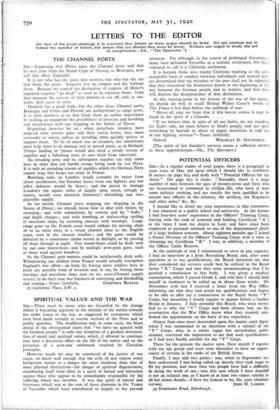SPIRITUAL VALUES AND THE WAR
SIR,—There must be many who are disturbed by the change which is becoming apparent in the attitude of the nation towards the wider issues of the war, as suggested by statements which have been made recently in certain sections of the Press and in public speeches. The modification and, in some cases, the blunt denial of the oft-repeated claim that " we have no quarrel with the German people " is only one symptom of a gradual deteriora- tion of moral and spiritual values, which, if allowed to continue, may have a disastrous effect on the life of the nation and on the prospects of a post-war settlement inspired by Christian principles.
However much we may be convinced of the justice of our cause, we know well enough that the. evils of war expose every belligerent nation to a danger far more insidious than that of mere physical destruction—the danger of spiritual degeneration, manifesting itself most often in a spirit of hatred and bitterness against those who appear to be immediately responsible for the suffering which war involves. It was this spirit of hatred and bitterness which was at the root of those elements in the Treaty of Versailles which have contributed so largely to the present
situation. For although, in the course of prolonged discussion-, many have defended Versailles as a realistic settlement, few have ventured to call it a Christian settlement.
It is because those who regard Christian teaching as the only acceptable basis of conduct between individuals and nations alike are determined that the mistakes of the past shall not be repeated that they welcomed the distinction drawn at the beginning of the war between the German people and its leaders, and that they will deplore the disappearance of that distinction.
At this turning-point in the history of the war of the nation, we should do well to recall Bishop Walter Carey's words in The Times a few days before the outbreak of war :
" Above all, may we hope that if this horror comes it may be faced in the spirit of a Crusade. . . .
" If we believe that, in spite. of all our faults, we are standing for God's side, we must behave as God's people, and not spoil everything by hatreds or abuse or pagan moralities in and out of our fighting services:"—Yours faithfully,
[The spirit of last Sunday's services seems a sufficient answer to these apprehensions.—ED., The Spectator.]






























 Previous page
Previous page